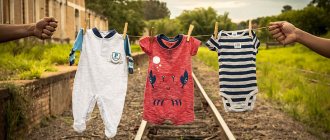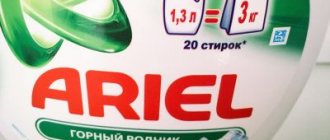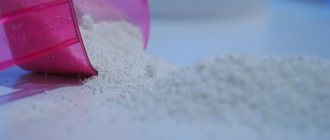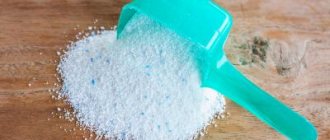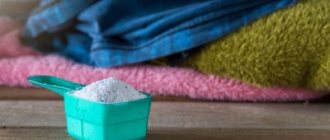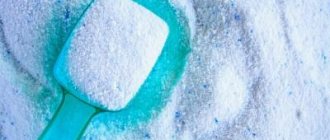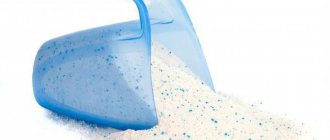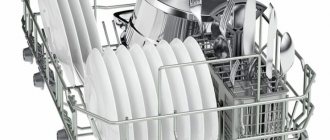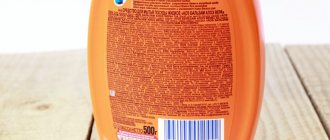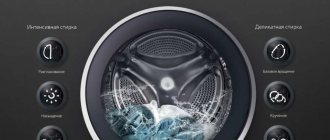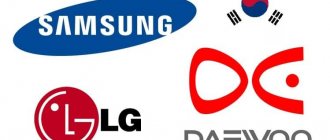Nowadays, the choice of washing powders is huge. On store shelves you can see many names, types, manufacturers, etc. Looking at the composition, you should even start to panic a little: a large number of unknown letters, numbers and words.
Today, the safest are phosphate-free powders. It’s worth figuring out what kind of beast this “phosphate” is and why it’s dangerous.
- Harm from phosphates
- Why are phosphates added?
- Composition and benefits
- Choosing the best powder
- Consumer Reviews
What is phosphate and surfactant
Most synthetic detergents contain phosphates, substances added to soften hard water. Their introduction into the composition of the washing powder makes it easy to wash things with the addition of a small amount of detergent.
Unfortunately, phosphates can:
- provoke allergies,
- respiratory tract diseases;
- Domestic wastewater is poorly treated from them.
Therefore, phosphates can cause serious harm to humans and nature.
Surfactants are surfactants, another component of cleaning products and washing powders. Organic compounds allow you to quickly break down and remove fat molecules present on dishes, linen and simply on a person’s hands. Surfactants are found in soaps, shower gels, shampoos, and many cosmetics. Without them, the cleaning power of the product is noticeably reduced.
What is phosphate-free powder
Household chemicals intended for washing clothes may contain a variety of substances. Most of them are added to the powder to improve the quality of washing. Cheap phosphates also belong to such elements. Substances in this group soften water, as a result of which the powder foams better and, therefore, removes contaminants better. However, studies conducted in the last century revealed the fact that phosphates can have extremely negative effects on the human body. These substances disrupt the acid-base balance of the skin, degrease it and can cause allergies. In addition, phosphates are also difficult to rinse out of laundry.
Advantages
Phosphate-free washing powders, while maintaining the usual quality of washing, are gentle on the skin, cause allergies much less often, wastewater is easy to clean, since the natural components of such products quickly decompose without harm to the environment.
Important: you need to remember that phosphate-free powders do not remove too much dirt the first time. At the same time, they are great for well-groomed items.
Such products can be used to wash the clothes of newborn children and people with dermatological problems.
Chistown powder: consumer opinion
Products of this brand intended for washing are produced by Eurasian Soap Company LLC. According to housewives, Chistown phosphate-free powders wash clothes well. Their advantages primarily include the ability to use water of any hardness without loss of quality. The downside is the need for a long rinse. Judging by the composition, Chistown powders are practically the same soap, but ground to small particles. Even the manufacturer himself recommends pouring the product into the machine not through the tray, but directly into the drum. Therefore, according to many housewives, “Cleantown” is a product more suitable for hand washing. However, most advise not to pour too much powder into the water. Otherwise, it will be really difficult to rinse things later.
Eco-producers
Phosphate-free powders have been produced in the world for more than 15 years; many European companies have loyal customers who use their favorite products; Today, Russian manufacturers have also mastered the production of such products.
See also
Tips on how to properly wash trousers in a washing machine and by hand
Attack
Phosphate-free powders and washing gels with this name are produced by the Japanese company KAO. The use of chlorine and phosphates in household chemicals was banned in Japan in 1986; since 1987, the brand appeared on the Japanese market, and then on the world market.
The products wash things well, are used economically, and are suitable for washing children's clothes.
BioEX
Available for hand and machine wash. Economical consumption, absence of phosphates and chlorine. Easily removed by rinsing.
Milti-action
Concentrated, economical product. It removes stains perfectly, refreshes the color of things, and is 90% environmentally friendly.
BioMio
Phosphate-free product from the Russian manufacturer Splat-Cosmetics. Available for hand washing, automatic washing machines, and products for washing dishes. The powder consists of natural, easily decomposed components, is concentrated, and is used sparingly. Customer reviews vary greatly - from enthusiastic to negative.
Burti Color
Powder for colored items from German manufacturers. Does not contain phosphates, chlorine. Has a light pleasant aroma. Doesn't generate dust when poured. It rinses well and does not cause dermatological problems.
Dalli Wohlfuhl
Another German washing powder. Universal, suitable for hand washing and automatic washing machines. Contains oxygen bleach, removes complex stains. Easily removed from fabrics by rinsing. Operates in the range from +95 to +30 °C.
Dr. Frank
The gel and washing powder do not contain phosphates and have a pleasant, unobtrusive aroma. Can be used for automatic machines, protecting them from scale. Made in Germany, it is easily removed by rinsing.
Ecover
A completely biodegradable product from the Belgian company of the same name. Free of fragrances, optical brighteners and phosphates. Don't expect it to remove tough, old coffee, tea, or fruit juice stains. Safe for hands, you can use it to wash newborn babies' clothes.
What to look for when choosing an eco-friendly laundry detergent
The purchased special product should not be a source of problems, therefore, when choosing, you need to carefully study the composition and trusting only those tested on the packaging does not guarantee a safe composition.
Real and natural laundry detergents have a fairly high price, so if you are offered a product at a super price, then it is better to play it safe and carefully check all the information provided.
The best foreign manufacturers:
- Ecover is a universal product, made in Belgium;
- Nordland - a super remedy from Korean manufacturers;
- Biomio - a joint work of Russia and Denmark, does an excellent job of washing at low temperatures.
Domestic manufacturers are not inferior either:
- EverClean - economical to use and has no odor;
- Molecola Ecological – cares for color, but is useless against old stains;
- Ecoleiv - suitable for washing towels and bed linen, but has a smell after washing.
Rating of safe products
People who have suffered from allergies for years, have small children, or simply care about the preservation of the ecosystem for future generations, try to choose the safest laundry detergents.
MaKO Clean
Russian children's washing powder that does not contain phosphate, chlorine, or aromatic fragrances. Suitable for all types of laundry, hand and machine washable. Does not cause allergic reactions, does not generate dust when poured, economical (55 grams per wash). Available in environmentally friendly, biodegradable packaging.
See also
How to wash black clothes correctly, cleaning methods and the best products
Ecover
A line of Belgian phosphate-free products. Completely decomposes without harming nature. Chlorine, fragrances and phosphates are completely absent from this washing powder. After washing, things are soft and do not require the use of conditioner.
Ecodoo
Ecodu is a line of French home care products. Washing powder is safe for hands, hypoallergenic and economical. It contains no preservatives, dyes, or phosphates. The base is Aleppo soap, a mixture based on olive oil and laurel fruit extract.
BioMio Color
Russian phosphate-free powder for colored laundry. Refreshes color, is economically used, suitable for newborns, pregnant women and users prone to allergic reactions.
Klar EcoSensitive
German washing powder based on soap nuts, suitable for white fabrics and items with strong colors. Instead of phosphates, it contains zeolite - a substance that is safer than phosphates. Suitable for asthmatics and allergy sufferers. No fragrance. It is easily removed from fabric fibers when rinsed. Washing gel is also available.
Harm from phosphate products to humans and nature
Scientists have carefully studied the effect of phosphate-containing particles on humans. The appearance of dermatitis and allergic reactions was detected. The components enter the blood through the skin. In high concentrations, they lead to disruption of metabolic processes and exacerbation of chronic diseases.
Solutions of phosphate agents practically do not decompose after disposal. Even treatment facilities cannot cope with them completely. Once phosphates enter water bodies, they cause rapid algal blooms. They pollute rivers and lakes.
Criterias of choice
Consumers are approaching environmentally friendly products in different ways. Some suffer from diseases, others are looking for products that are not tested on animals (phosphate-free powders are just like that), others choose safe formulations for their children.
Price
Such products, of course, are somewhat more expensive than conventional detergents, but if you take a large package at once, the price becomes quite comparable to conventional laundry detergent, due to the economy of using phosphate-free formulations.
Frequency and duration of washing
They are great for frequent and even daily washing. The duration directly depends on the degree of contamination. For unworn items without stains, 15 minutes is enough.
Main directions
The products are available for colored and white laundry; they may have a delicate aroma or be fragrance-free. The formulations are specially developed for children or may be intended for asthmatics and allergy sufferers. In addition to bulk products, gels with the same qualities are very relevant.
"Stork"
According to most mothers, this is actually a good phosphate-free powder, one of the best on the domestic market. “Stork” is absolutely harmless, produces a lot of foam and perfectly washes even the dirtiest laundry. Some housewives only note the fact that if there are some very difficult stains on things (for example, from juice), they have to be washed 2-3 times. The advantages of this powder include the complete absence of odor. This product is also made from ordinary laundry soap.
List of baby laundry detergents
Products intended for children are hypoallergenic and better remove bio-contaminants (stains from milk, juices, purees). They are safe for the delicate skin of babies.
our mother
The product resembles soap shavings. Doesn't dry out the skin of your hands. Hypoallergenic and safe for baby. Difficult stains require preliminary washing with laundry soap. It rinses out fabrics well and leaves laundry soft.
See also
Review of products for washing down jackets in a washing machine and by hand
stork
Families with children have long been familiar with this washing powder, since it is a well-known Russian brand. The production of this product takes place in St. Petersburg. The product does not contain fragrances and does not cause allergies.
Eared nanny
The children's washing powder produced by the Nevskaya Cosmetics company has a funny, memorable name. It has almost no odor, attracts with an affordable price, there are many conflicting reviews on the quality of washing, but this happens with any popular product.
Karapuz
A line of products for washing children's clothes from the first days of life. Does not contain phosphates and zeolites. Hypoallergenic and safe for babies. Users complain that it doesn't remove stains very well.
Remember: the biologically active ingredients contained in baby powders to combat stains your baby may have left do not work in water that is too hot. Optimal washing temperature: +30…+32 °C.
The product is economical, suitable for newborns, and can be easily removed by rinsing.
Burti Hugiene
It is not positioned as a baby powder, but is great for washing baby clothes. It washes well, leaving things bright, without a gray cast. Economical, does not cause allergies, protects against fungi and bacteria. The only negative is the high price.
Amway baby
Children's washing powder with a light, unobtrusive aroma, does not contain phosphates and zeolites. Many products contain some oxygen bleach. Reviews about the product vary greatly; many people like the powder; they also write about the poor quality of washing. The product is harmless to babies and does not linger in tissues.
Foreign powders
As you can see, all domestically produced products are of good quality. However, almost any Russian phosphate-free powder is, in fact, ordinary planed soap, laundry or baby soap. What about foreign analogues? What specific components are included in the European powders of this group? At the moment, among the universal ones, the most popular among domestic housewives are products from the brands Amway, Sodasan and Klar. As for Amway, judging by the reviews, it is an ordinary powder, not at all similar to soap. Instead of phosphates, it contains less harmful phosphanates.
Sodasan are also good phosphate-free laundry detergents, which contain only natural ingredients. Many people believe that this brand of powder washes things better than Amway (at almost the same cost). The only thing is that there are quite contradictory reviews about the smell of this powder. Some find it enjoyable, others don't.
Klar is also a pretty good powder. Many housewives use it to wash colored laundry. Instead of phosphates, Klar powder contains relatively harmless zeolites.
Thus, phosphate-free products, both domestic and imported, according to housewives, do their job well in most cases. And since they really do not have virtually any harmful effects on the body, it is certainly worth buying at least a pack of such powder for testing.
What are phosphates replaced with?
Replacing chemicals with gentler substances has a positive effect on health, but is more expensive.
Phosphonates are esters. They are considered a safe replacement for harsh chemicals. These substances are less harmful to the environment, but their effect is several times weaker than phosphorus salts. The use of ethers is much more expensive. They have allergenic and carcinogenic properties. It is believed that products containing phosphonates are not dangerous to humans. Zeolites threaten the environment and humans. Their use increases the cost of the product by an average of 30%. Due to their high molecular weight, these chemicals of the silicate group cause breakdowns in the washing machine and increase the load on the cleaning facilities, which accelerates their wear.
In EU countries, thanks to strict legislative measures, penalties against manufacturers and environmental education of the population, attempts are being made to switch to natural detergents. Natural ingredients that replace phosphates include palm soap, soap nuts, and fatty acid salts. They are expensive and degrade the quality of washing, but they have no negative impact on nature and humans.
How to properly use phosphate-free powders
Since phosphate-free products have a composition different from the powder we are used to, you must first read the instructions.
- Some products must first be diluted in boiling water and then added to the laundry. Most products are concentrated, so use the dosage according to the instructions, do not apply it to the eye.
- Pre-soak items before washing to remove any remaining phosphates in the wash.
- If bleaches or conditioners are used with phosphate-free products, make sure they do not contain chlorine or phosphates, otherwise the full effect of the phosphate-free powder will be lost. In addition, due to the wrong combination of detergents, the item can be hopelessly damaged.
